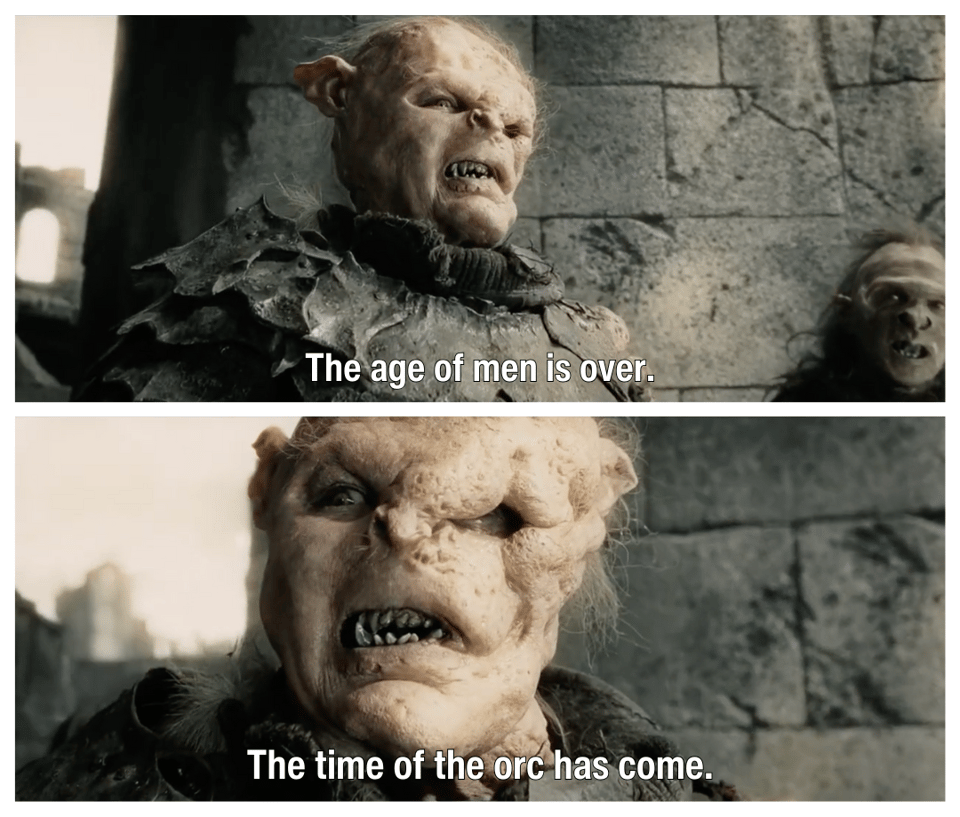the left, the right, and the lord of the rings
J.D. Vance wrote a book, but can he even read?

Last month, Vox released an episode of their Today, Explained podcast entitled “What the right gets wrong about Tolkien.”
Yes, I thought, YES. Finally someone else was going to talk about why Peter Thiel’s shitty companies are also shittily named. Finally the Lord of the Rings fandom could band together and eject this evildoer from our ranks.
The podcast was less about Peter Thiel than I’d hoped, but it did help me understand why right-wing weirdos think they have a claim on this text that I hold so dear.
The Lord of the Rings is such a lasting — and I would argue beautiful — text in part because it is so ambiguous. Unlike, say, Game of Thrones, where every character’s every aim is clearly mapped out, LOTR depicts a big bad guy seeking total domination of the world (to what end? unclear) and a coalition of good guys rising in righteous defense against this threat. If all Tolkien really says about the battle for Middle-earth is that one side is Good and the other is Bad, you can see why it’s so easy for literally anyone to cast themselves as the main characters of this story and anyone they disagree with as “the Enemy,” a term Tolkien often uses instead of naming Sauron or his forces directly.
Obviously, some people’s understanding of what is good and what is bad sucks, and so their interpretation of this text also sucks. Case in point: J.D. Vance. I want, very badly, to say that his simplistic reading of the central conflict in this story is just plain stupid, but at the same time I must own that I’ve used the below image more than once to characterize basically any man involved in right-wing politics.

See how easy it is? I am among the noble races of Men and Elves who are working to defend the beautiful world we share; my political opposites are the ugly dumb baddies. Anyone can say this and it will feel true to them!
In the podcast, New York Times columnist David French tries to justify through textual evidence what I have so far only claimed on the basis of vibes, which is that conservative interpretations of The Lord of the Rings fundamentally miss the point. Tolkien’s whole thesis, he argues, was that the “will to dominate” is inherently a bad thing, regardless of your motivations.
French uses the characters of Boromir and Faramir as an example: The former seeks to save his city and mankind, but in trying to take the Ring from Frodo to achieve his ends, slips into bad guy territory. Faramir, on the other hand, definitively refuses to take the Ring when given the chance. “I would not take this thing, if it lay by the highway. Not were Minas Tirith falling in ruin and I alone could save her,” Faramir says in The Two Towers. The stakes are no less dire for him than they were for Boromir — Sauron poses an existential threat to his community and his entire way of life — but still he understands that to try to defeat evil by adopting its means of power and control is merely to capitulate to that evil. (French wrote further about this in the New York Times last year.)
Peter Jackson’s adaptation spices Faramir up a little bit — in my opinion, to great effect. In the film, Faramir initially decides that “the Ring will go to Gondor.” Motivated both by a need to protect his people and a desire to prove his worth to his father, he takes Frodo and Sam captive and plans to bring them back to Minas Tirith. But eventually he changes his mind and chooses to release the hobbits — and the Ring — from his possession.
This is an area where I felt the films improved upon the source text (nobody throw things at me please). The Lord of the Rings often reads more like an epic than a novel: Many of Tolkien’s characters are not characters as we understand today, but archetypes. In the books, for example, Aragorn is not the tormented ranger who refuses his call to kingship many times only to rise up in noble heroism right at the end, but this goofy dude who galavants around the countryside saying, “I’m the king! I’m very good! I’m doing king shit and it is very good!” (Again, please do not throw things at me.)

Jackson’s adaptation humanizes many of the characters, acknowledging that few people are made purely of either good or bad moral substance. Aragorn wrestles with doubt and is even visibly tempted by the ring in his test at the end of Fellowship. Faramir stumbles before choosing the honorable path. Nearer the end of the trilogy, Frodo and Gollum both wrestle with the weight of the Ring, the pull of evil, and their innate (if deeply buried, in the case of Gollum) desires to do good and be true to themselves.
These are human and relatable stories to tell, stories that may have been less interesting to Tolkien but which are captivating and compelling to a modern audience. I think these changes to the characters also make the LOTR films a more liberal text, where the books are actually quite conservative. Not in the way J.D. Vance wants them to be, but in the way you would expect when you remember that they were written in the mid-20th century by a middle-class Englishman who was obsessed with the Anglo-Saxons.
Yes, Middle-earth is saved by the quiet but heroic deeds of an unassuming main character, but that main character is a landowner who is aided by, essentially, his manservant throughout the journey. (Samwise is one of the only named characters in the whole trilogy who works for a living.) The hobbits’ victory over Sauron is expanded upon by Aragorn assuming control of most of the realm when he restores an ancient monarchic line. And Tolkien only grudgingly admits to the existence of women through three characters, all of whom are young (or young-looking) and beautiful, and one of whom does cool warrior shit for a while before remembering what she actually wants is to heal people and be a wife.
Based on all this, it might be tempting to think, “Wait a minute, maybe the right really does have a claim on this series. Maybe this is another fandom ruined.”
But let’s remember to not be stupid.

As David French claims on the podcast (in the podcast?), The Lord of the Rings does not merely describe a battle between good and evil, but “it also teaches you what good should be and what good should look like. Good is compassionate. It cares for the vulnerable. It preserves and protects natural beauty. It shuns domination and the will to power.”
While I think this is a rosy, idealistic reading (one that elides Tolkien’s obvious hard-on for the monarchy), it certainly comes closer to the truth than any of the orcs in the “I love Hitler” group chats have any hope of reaching. Tolkien’s work asserts, poetically and doggedly, that goodness is objective. It is something you can innately understand, something that can be felt and seen. And it is simply not any of the things currently uniting and animating the right, which, as far as I can tell, are just a fetid pile of intolerance, schadenfreude, militant authoritarianism, and a blind hunger for power at all costs. If you perceive yourself to be in the middle of an apocalyptic battle for the fate of your nation but your enemies are <checks notes> poor people and immigrants and trans kids, then I’m sorry to say but you are the baddies.
Good can be a lot of things, but it is not the thing that makes you grasp at the power offered by evil and in so doing extend its shadow.
“But Lauren,” you may be asking as this rather pointless and unstructured rant continues, “does any of this even matter? Or are you just mad that the Vice President of the United States is wrong about Lord of the Rings?”
Listen, the answer to both of those questions is yes. I hate that J.D. Vance and Peter Thiel think they can claim some kind of ownership over one of my favorite stories and that they named their shitty, evil companies after objects gifted to us by Tolkien’s imagination. Pettily, I don’t think they should be allowed to take enjoyment from the same things that I enjoy.
But I also believe that the messages we take away from stories matter.

I’m part of a somewhat intimidating book club, a plurality of whose members are Harvard-educated lawyers. Because we are all the types of people who like to be challenged by the books we read and who enjoy the stimulating conversation that arises from them, we read a lot of downers. In recent meetings, as we have discussed the many horrors of the book of the month, several members have arrived at the same conclusion: people are terrible, there is nothing to be done about it, we are cooked.
And while I concede that these women are all smarter than me, and that they engage much more with the worst humanity has to offer than my pampered freelance work-from-home ass ever will, I simply cannot get on board with this takeaway. It is the kind of cynical, reductive, fatalistic reading that I can see J.D. Vance applying to The Lord of the Rings. It’s an interpretation that kindles fear of the other, stokes resentment, adds big dry logs to the growing belief that the only way to save humanity is to seize power by any means. It’s the outlook of Boromir.
In French’s 2024 column, he points to this lovely passage from The Return of the King, when Frodo and Sam are deep into their long, dreary trudge through Mordor:
There, peeping among the cloud-wrack above a dark tor high up in the mountains, Sam saw a white star twinkle for a while. The beauty of it smote his heart, as he looked up out of the forsaken land, and hope returned to him. For like a shaft, clear and cold, the thought pierced him that in the end the Shadow was only a small and passing thing: There was light and high beauty for ever beyond its reach.
This image is so emblematic of Tolkien’s whole ethos, one where goodness and beauty and hope are Platonic ideals that one may draw upon if only they remain steadfast and pure of heart. It’s a good start, I think.

But — and I will once again implore you all not to throw things at me — this is another area where the films outshine the source text. There are two scenes from The Two Towers that I think about all the time:
Near the end of the battle of Helm’s Deep, King Théoden of Rohan (after whom my husband and I have only half-jokingly considered naming our unborn child) indulges in a moment of hopelessness.
“So much death,” he says. “What can men do against such reckless hate?”
In the book, he talks himself out of this hole with his own rousing, kingly speech. But in the film, it’s Aragorn who gives the pep talk. He answers, “Ride out with me. Ride out and meet them.”
It’s an instant vibe shift. Of course. Of course. THIS is what men can do against reckless hate. Let this be the hour when we draw swords together. Let’s fucking go.
This is soon followed by Samwise’s iconic speech in Osgiliath, which the filmmakers wrote and which borrows a bit from the “star in Mordor” passage above.
Sam: It’s like in the great stories, Mr. Frodo, the ones that really mattered. Full of darkness and danger, they were. And sometimes you didn’t want to know the end, because how could the end be happy? How could the world go back to the way it was when so much bad happened? But in the end, it’s only a passing thing, this shadow. … Folk in those stories had lots of chances of turning back, only they didn’t. They kept going. Because they were holding onto something.
Frodo: What are we holding onto, Sam?
Sam: That there’s some good in this world, Mr. Frodo. And it’s worth fighting for.
Like many other things in Tolkien’s books — magic, power, mythology — goodness is intangible. It is an ideal, an animating force, a sort of religion that guides the good guys on their journeys. But the movies add to this by saying: Yes, truth and justice and freedom are all things we should hold in our hearts to guide our actions. But at the end of the day, it is the actions that count. It is every small step we take toward Mount Doom, every reckless charge we lead against our foes, every decision we make to cast the Ring aside and instead hold fast to each other.
Stories matter because the lessons we learn from them matter. If you’re someone like me, these lessons may have a minimal impact — they will influence how I show up in civil society, they might inform the values I try to pass on to my son. But if you’re someone like J.D. Vance or Peter Fucking Thiel, these lessons may just tear the world apart.

Reading/Watching:
As Netanyahu predictably half-asses this current ceasefire, a reminder that the horrifying numbers of dead children in Gaza are the smallest part of the story. Every single one of the 18,457 confirmed dead was someone’s whole world.
“Trumpian stupidity … is less a form of organizational inertia or disarray than a slash-and-burn assault on the very things — universities, public health, market data — that help make the world intelligible.”
This old College Humor video floated up to the the surface of my internet soup and it is just an incredible parody of the pseudo-intellectualism that the new right uses to corrupt and recruit our young men. If I had great power, I would force everyone who has ever listened to an episode of The Joe Rogan Experience to watch it. (It’s only four-and-a-half minutes long so that’s not even being mean.)